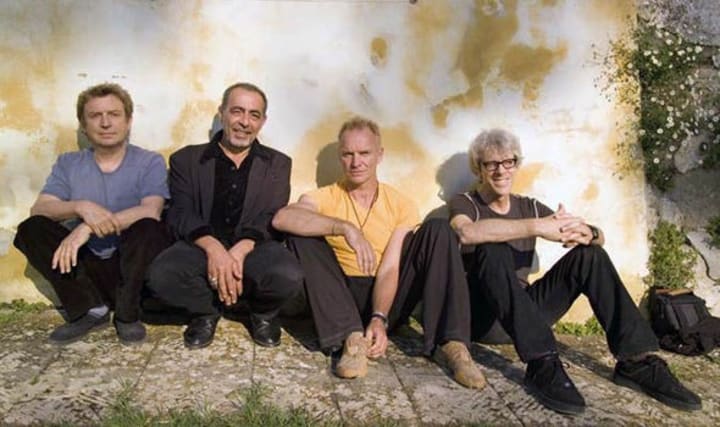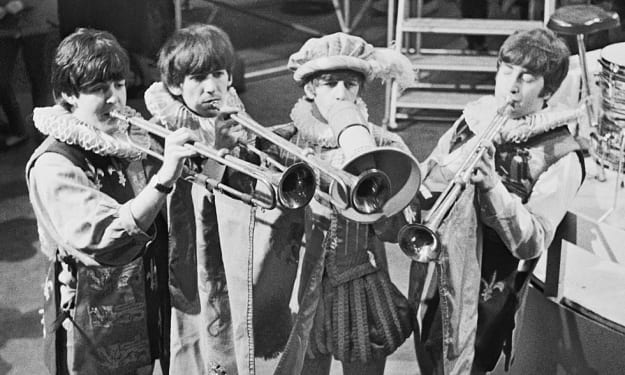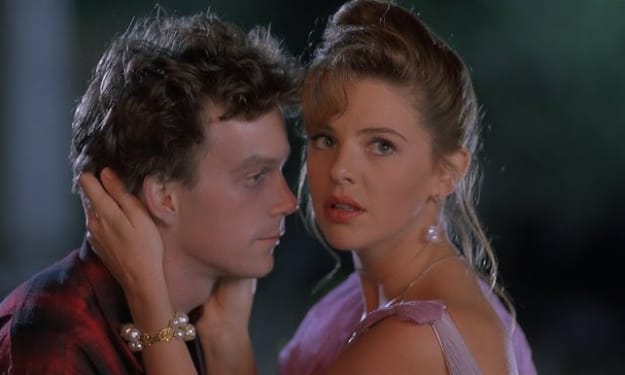
Over the years, there have been a multitude of excellent musical groups. As per the usual order of things, these bands often take many years and a number of line-up changes to finally achieve immortal success.
It is perhaps because of this, that a few musicians end up slipping past the minds of even the most die-hard fans. Be it due to a short stint in a group, leaving before a band’s heyday or being well-known for something else entirely, here are 5 forgotten members of iconic bands.
Without further ado, let’s begin!
#5. Henry Padovani: The Police

One of the greatest power trios of all time, most fans of The Police cannot imagine the group as being anyone else aside from Sting, Andy Summers and Stewart Copeland. However, there was at one time a fourth member of The Police, Henry Padovani.
Born in the French island of Corsica, Padovani was actually The Police’s original guitarist. With a growing interest in punk music and a chance encounter with Stewart Copeland, the group that would soon be known as The Police began to take shape. While Padovani was certainly passionate about his role in the group, difficulties began to arise due to a language barrier and Padovani’s own inexperience as a musician.
Sting in particular had begun to grow weary of what he felt were Padovani’s limitations. Eventually, veteran guitarist Andy Summers, approached the group and told them that he could help them reach far greater heights if they replaced Padovani with him. Unwilling to fire their friend, Sting and Copeland initially refused and The Police briefly played as a four-piece group.
Eventually, they gave in to Summers’ terms and dismissed Padovani from The Police. Padovani in turn, understood their reasons and amicably parted ways with The Police. He has since continued in music with his own bands and has collaborated with his ex-bandmates on a number of projects as well.
Perhaps the reason why most people do not remember Henry Padovani can be chalked down to two reasons. Firstly, Padovani was only in The Police for just around eight months. Secondly, the band had yet to reach the levels of superstardom that they soon would in the following years. Despite that, it is good to know that he has maintained good relationships with his ex-bandmates.
#4. Peter Green: Fleetwood Mac

With most groups, their leaders or founding members often remain one of the more memorable parts of their line-up regardless of whether they’re still in a band or not. However, many forget that the iconic Fleetwood Mac was founded by Peter Green. There are some who may not remember him having been in the band at all.
Forming the first incarnation of Fleetwood Mac in 1967, the group’s formation barely resembled the iconic Rumours line-up from a decade later. Under Green, Fleetwood Mac was well-known primarily as a live group which specialised in more Bluesy music.
It was also during this time that Green began experimenting with LSD. Unfortunately, the effects of the drug would begin to affect him psychologically and by 1970, Green left the band he formed. Over the years, Green would occasionally work with former Fleetwood Mac members in separate projects and even made an uncredited appearance on the band’s Tusk album. He would also be inducted into the Rock n Roll Hall of Fame as part of Fleetwood Mac.
Perhaps Green’s most recognisable contribution to the band during his time in Fleetwood Mac, would be writing the Rock classic Black Magic Woman. Made famous by Santana, Green would forego a performance with his original band during the Rock n Roll Hall of Fame ceremony in order to play his most recognisable hit alongside the person who made it famous.
#3. David Marks: The Beach Boys

Mixing together superb harmonies and beautifully written songs, The Beach Boys defined the “surf sound” of the 60s before moving into a more sophisticated direction. Known for each members’ close connections to one another, most fans remember the band’s main line-up as consisting of the Wilson brothers, Brian, Carl and Dennis, their cousin Mike Love and close friend, Al Jardine. In later years, Bruce Johnston would be added to the group as well.
However in 1962, Al Jardine left the Beach Boys in order to enrol himself into dental school. Needing a replacement for their guitarist, the band turned to David Marks, a friend and neighbour of the Wilsons. Marks’ guitar playing gelled extremely well with Carl Wilson’s and helped bring a more Rock feel to the group’s surf songs.
Marks played with The Beach Boys on their first four albums and stayed on with the group even after Jardine decided to come back. Unfortunately, just a year into his tenure with the group, financial disagreements began to arise between Marks and the group’s manager Murry Willson. Following a physical altercation between Marks’ parents and Wilson, Marks left the group just as they had begun reaching the pinnacle of their success.
Despite his acrimonious exit, Marks remained friends with his ex-bandmates and continued on as a successful sessions musician. Interestingly, he would reunite with The Beach Boys on a number of occasions and even returned to the group full-time for a stint in 1997. Today, Marks continues his work as a sessionist and has begun working more frequently with fellow Beach Boys, Brian Wilson and Al Jardine.
#2. Ian Stewart: The Rolling Stones

Ian Stewart’s time in and out of The Rolling Stones was so interesting, that I had already written a whole article about it. Essentially, Stewart was the second ever person to join the iconic band after answering an ad posted by Brian Jones. He was only a member of the band for just over a year.
A talented Blues pianist, Stewart was a more reserved person who enjoyed the music more than the fame or decadence that came with it. Noticeably older and more portly than the rest of The Stones, Stewart was let go by the group just a year into their run. The group’s manager, Andrew Loog Oldham, had wanted a group of attractive young men that he could market as sex symbols to counter the more clean-cut image of The Beatles.
Unfortunately, Stewart did not fit that description and was asked to step aside. However, while others in this list moved away completely from their old groups, at least for a period of time, Stewart remained committed to The Rolling Stones and transitioned into the band’s road manager.
While seen as a demotion to most, Stewart was happy in his new role. He did not have to be in the public eye but could continue to be around his friends. On top of that, Stewart continued to be a good influence to the group as he kept them on their best behaviour and had his opinions sought out as part of their creative process.
Most notably, Stewart would play on almost every Rolling Stones album following his official departure from the group and occasionally joined the group onstage. While fans may have forgotten him, Stewart’s role within The Rolling Stones has been something that the band has held in very high esteem. It goes to show you can be in a band without technically being in a band.
#1. Stuart Sutcliffe: The Beatles

Now this was a tough one as I was torn between either Stuart Sutcliffe or Pete Best. I chose Stuart Sutcliffe because of his shorter tenure with the band and less conspicuous departure from the group.
Long before The Beatles became the iconic Fab Four we know today, they were a five-piece group with a line-up very different from what most audiences were used to seeing. Stuart Sutcliffe, was the band’s original bassist. Sutcliffe was also the only member of The Beatles to have not been born in Liverpool. He had moved there as a child after being born in Scotland.
A friend of John Lennon’s, the two boys were especially close thanks to their shared interest in art. It is also commonly accepted that Sutcliffe and Lennon were the ones that helped develop The Beatles name to serve as a pun on the word “beat” and to reference Buddy Holly and The Crickets.
Alongside Lennon, Paul McCartney, George Harrison and Pete Best, Sutcliffe would travel to Hamburg where The Beatles first made a name for themselves. Sutcliffe distinguished himself from the rest of the band with his quieter demeanour and dark sunglasses on stage. However, it soon became apparent that music was not Sutcliffe’s true passion.
A talented artist, Sutcliffe was encouraged to pursue art further as many felt he had the potential to make a name for himself in that field. Sutcliffe himself was passionate about his art and eventually chose to remain in Hamburg in order to further his studies. Leaving on amicable terms, Sutcliffe seemed poised on a promising career as an art teacher before unfortunately passing away due to a brain haemorrhage at the age of 21.
In total, Sutcliffe had spent only 15 months in The Beatles and did not live to see the full success of BeatleMania. Paul McCartney would later borrow Sutcliffe’s bass guitar when he took over as bassist and developed his “upside-down” playing style after being instructed to not change the guitar’s strings.
At the end of the day, Sutcliffe may have disappeared into the annals of history but he lived and died doing what he loved. Despite his brief time as a member of The Beatles, he left a profound effect on the band’s legacy and the members themselves that cannot go understated.
That does it for this list! If you made it this far, allow me to thank you for taking the time to read this! It goes to show that even among some of the most famous bands of all times, there exist a few unsung heroes who often play roles in the earlier stages of a group’s run.
Do let me know if there are other similar people in other groups. I might make a follow-up to this somewhere down the line. Until then, take care!
About the Creator
Isa Nan
Written accounts of life, death and everything in between






Comments
There are no comments for this story
Be the first to respond and start the conversation.